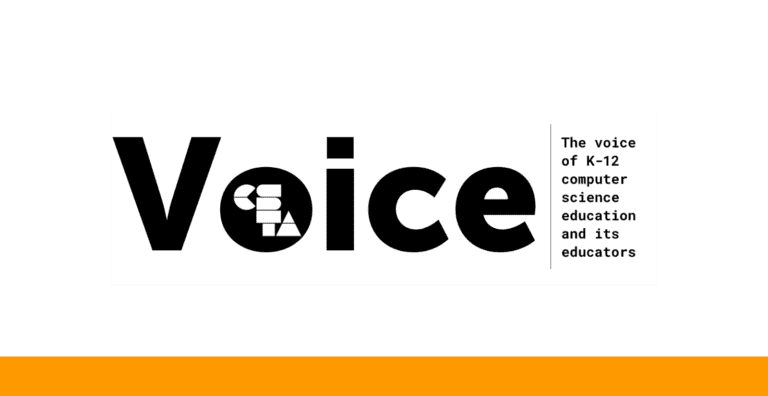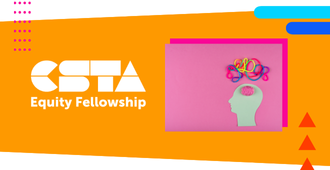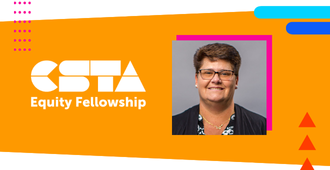
CSTA Equity Fellow Sonal Patel is the Digital Learning Innovation Coordinator at San Bernardino County Superintendent of Schools.
Full Story
 CSTA Equity Fellow Sonal Patel is the Digital Learning Innovation Coordinator at San Bernardino County Superintendent of Schools. She supports educators, coaches, and administrators in educational technology pedagogy that is centered around digital accessibility and inclusion. Sonal has also been leading county and state-wide efforts in broadening K-12 access and participation in Computer Science.
CSTA Equity Fellow Sonal Patel is the Digital Learning Innovation Coordinator at San Bernardino County Superintendent of Schools. She supports educators, coaches, and administrators in educational technology pedagogy that is centered around digital accessibility and inclusion. Sonal has also been leading county and state-wide efforts in broadening K-12 access and participation in Computer Science. “Equity in education means that every student has the full potential to succeed socially, intellectually, culturally, and emotionally,” said Patel. “Regardless of their backgrounds, students should receive a quality education adapted to their needs, removing all possible barriers. As a digital learning professional development provider, I create learning opportunities for educators aligned with Universal Design for Learning (UDL) principles.”
In her work, Patel encourages educators to consider how students of all backgrounds receive equitable instruction by acknowledging students’ cultural heritage and accommodating multiple learning modes. “Creating a welcoming and inclusive space for students to thrive is essential, and that begins with building relationships and then intentionally designing lessons that will engage learners of diverse backgrounds and needs,” she shared. “Using the design thinking model helps me to model for educators how students could be provided with a variety of choices to solve community-based problems that contribute to social good. With that, the educator acts as the facilitator of the learning experience. Whether through video, or a creative project using code, students are given the tools, resources, and guidance necessary for success.”
“Equity in education also means being culturally responsive to student needs,” continued Patel. “A big part of being a culturally responsive educator is believing in students and having high expectations for all students.”
Patel is working to disrupt inequities for marginalized groups in computer science by inviting educators of color and people who identify as females or non-binary to be involved in the Computer Science Equity Task Force (CSETF)*. The CSETF represents a vision where all K-12 students within the Inland Empire have access to computer science (CS) education. “This involves meaningful discussions around equity in computer science, strategies and ideas to develop computer science professional learning, and systemic changes needed to provide rigorous and inclusive CS education,” said Patel.
Being involved in the task force meant that educators, administrators, family engagement leaders, and counselors needed to attend bi-monthly meetings to create a vision for our county-wide effort to expand computer science. In those meetings, we centered discussions around the CS Equity Guide. Through this, CSETF built awareness of CS equity and shared perspectives of what could potentially impact a more equitable CS education.
Through her work with CSETF and feedback provided by key educational stakeholders, Patel learned that computer science professional development was at the height of all computer science equity conversations. “As a result, I have diligently planned computer science professional development for this year,” said Patel. “From the county level, I can provide the resources necessary to expand access.”
One example of a recent summer endeavor was a MicroBit training opportunity for educators across the country with Pathfinders and MicroBitEDU as the facilitators. At the end of the training, Patel provided a survey that indicated excitement and positivity around beginning CS education as early as this Fall. Her group also has multiple CS subject integration workshops (as requested through survey feedback) that incorporate UDL concepts for Middle school educators planned for this school year.
Patel is also a member of Supporting Computer Science Access, Leadership and Equity in California (SCALE-CA), which is composed of researchers from UCLA and the American Institutes of Research and 17 local education agencies (counties, districts, and schools) across the state of California, representing the geographic and demographic diversity of the state.
“As an equity-focused group, we have been having many conversations around inclusion and representation and how best to implement equity-minded computer science education,” shared Patel. “The SCALE-CA group values the unique voices, experiences, and expertise of all members, which ultimately helps us to create positive changes in CS.”
Patel applied to become a CSTA Equity Fellow to learn how to advance computer science equity throughout the nation to promote large-scale changes that broaden participation in computer science. She’s currently entering her doctoral dissertation on computer science equity and looking forward to the fellows’ support, collaboration, and advice to advance long-standing changes in CS.
“My goal is to continue to disrupt the inequities and give more students opportunities they need to succeed.”
*This is now known as the Computer Science Equity Network.
Learn more about the CSTA Equity Fellowship and this year’s cohort here.




